| |  | | | Latest on Israel; The Threat of Western Islamists By Winfield Myers ● Sep 24, 2025 Smart Brevity® count: 7 mins...1827 words Lazar Berman assesses the "hollow recognition" of a state of Palestine by Western powers, an act that rewards Hamas's terrorism while asking nothing in return. In a second article, Berman writes that as the Abraham Accords turn five, Israel remains optimistic that, despite the ongoing fallout from its strike on Qatar, the agreement's foundations are resilient. Dexter Van Zile says that the Council on American-Islamic Relations' (CAIR) relatively restrained statement following Charlie Kirk's assassination contrasts sharply with its (unsurprising) condemnation of Israel following its Sept. 9 attack on Hamas in Doha. For CAIR, it's all about whipping up anti-Israel sentiment, not educating policy makers or the public. We follow with five more articles examining Islamist threats in Canada, France (two articles), and Germany, plus a look at the case of a Turkish mob boss whose arrest in Italy may save him from torture in Turkey. | | Israel Unites Against Hollow Recognition of Palestine, but PM Could Be Pushed Too Far 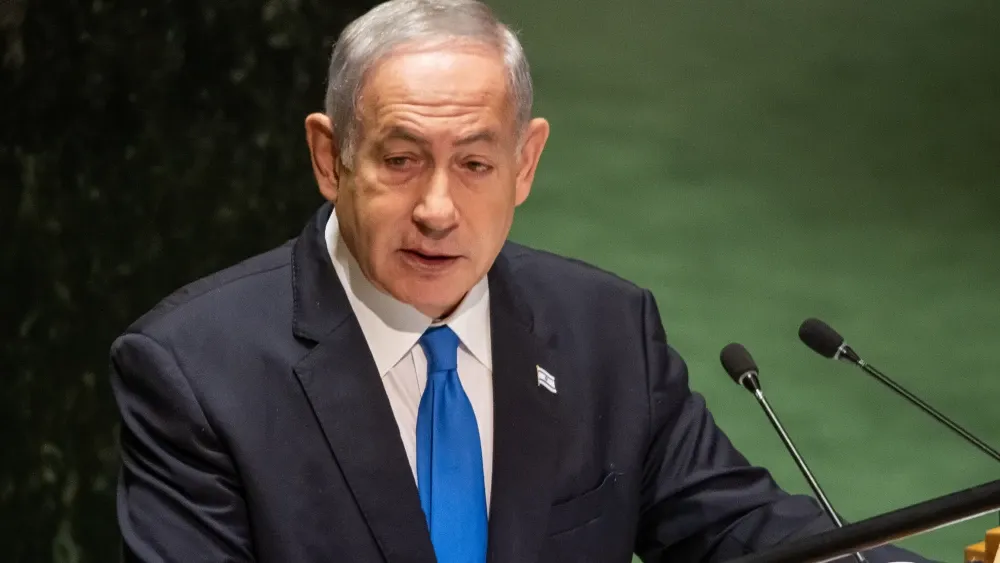 By: Lazar Berman The United Kingdom, Canada, Australia, and Portugal have formally recognized a Palestinian state, sparking anger from Israel and accusations of rewarding terrorism. Why it matters: This recognition challenges the 1995 Oslo II Accords and could empower Hamas by increasing international pressure on Israel without demanding concessions from the Palestinians. Western leaders' rationale: British PM Keir Starmer and others claim the decision supports a two-state solution, sidelining Hamas and encouraging peace. Diverse reactions: Israeli leaders from across the political spectrum united in rejecting the move, viewing it as a reward for terror. Regional implications: PM Netanyahu faces pressure to respond, with annexation of the West Bank mentioned as a potential move, despite risks of alienating Arab partners and losing U.S. support. To read the full article at the Times of Israel, click here. | | As Abraham Accords Turn 5, Israel's Willingness to Use Its Military Might Becomes Concern for Allies 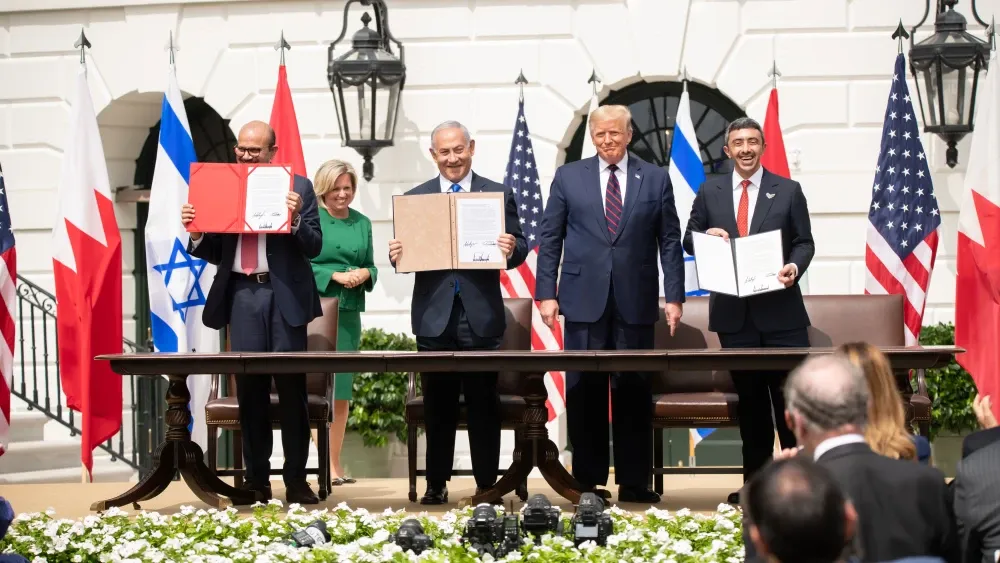 By: Lazar Berman Five years after the signing of the Abraham Accords, optimism and challenges persist as geopolitical tensions test the strength of the agreements. Why it matters: The accords initially promised a transformed Middle East, but recent events like the failed Israeli strike on Hamas leaders and the subsequent Doha summit show the complexities of regional politics. Optimism and concern: While diplomatic ties have expanded, the accords have not fully met initial expectations. Polls indicate declining popularity, and recent tensions highlight ongoing challenges. Geopolitical impact: Israel's recent military actions against Iran and its proxies have shifted regional perceptions, with some viewing Israel as a dominant force rather than a stabilizing one. Looking ahead: Israeli diplomats remain optimistic, believing that the foundational work laid by the accords will facilitate future progress once regional tensions ease. To read the full article at the Times of Israel, click here. | | CAIR Issues Restrained Statement on Kirk Assassination After Demonizing Israel 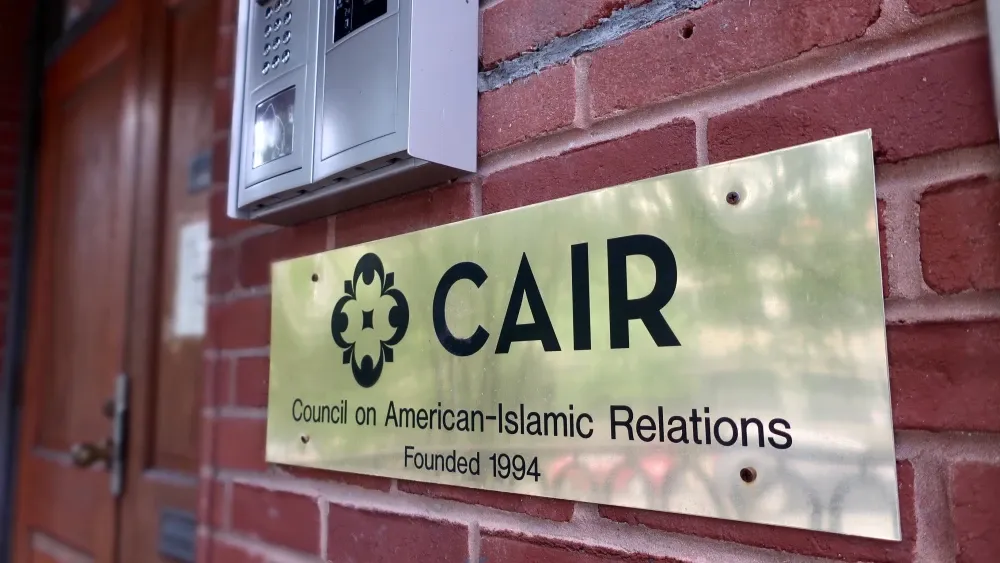 By: Dexter Van Zile The Council on American-Islamic Relations (CAIR), whose current leader, Nihad Awad, met with Hamas operatives in Philadelphia in 1993, issued a "forceful" condemnation of the September 10 assassination of conservative activist Charlie Kirk. The condemnation came the day after CAIR and another group, the United States Council of Muslim Organizations (USCMO), condemned Israel for its September 9, 2025, attack on Hamas leaders in Qatar. Why it matters: CAIR's statements, aligning as they do with radical Islamist narratives, undermine U.S. interests and promote hostility against Israel. CAIR's inflammatory response: Characterizing Israeli PM Netanyahu as "drunk on power" and accusing the U.S. of facilitating "genocide" reflects CAIR's ongoing extremist stance. Echoed by USCMO: The United States Council of Muslim Organizations, in lockstep with CAIR, labeled Israel a "pariah state," further inciting anti-Israel sentiment. To read the full article, click here. | | The Muslim Brotherhood Poses an Insidious Threat to Canadian Society  By Joe Adam George and Dagny Pawlak A 1991 memo by the Muslim Brotherhood outlined a strategy to undermine Western civilization from within, now echoed in its alleged deep-rooted influence in Canada. Why it matters: The Brotherhood's network in Canada extends into civil, academic, and political spheres, raising concerns about national security and societal cohesion. Strategic infiltration: The Brotherhood seeks to influence policy and society under the guise of religious and educational activities, building an ideological infrastructure through charities, schools, and mosques. Policy implications: As other nations move to curb the Brotherhood's influence, Canada faces pressure to address the growing threat of radicalization and terror financing. Call to action: The Canadian government must develop a proactive approach to counter the Brotherhood's "grand jihad" plans and protect democratic values. To read the full article, click here. | | France Shuts Down Islamist Seminary for Legitimizing Jihad and Sharia 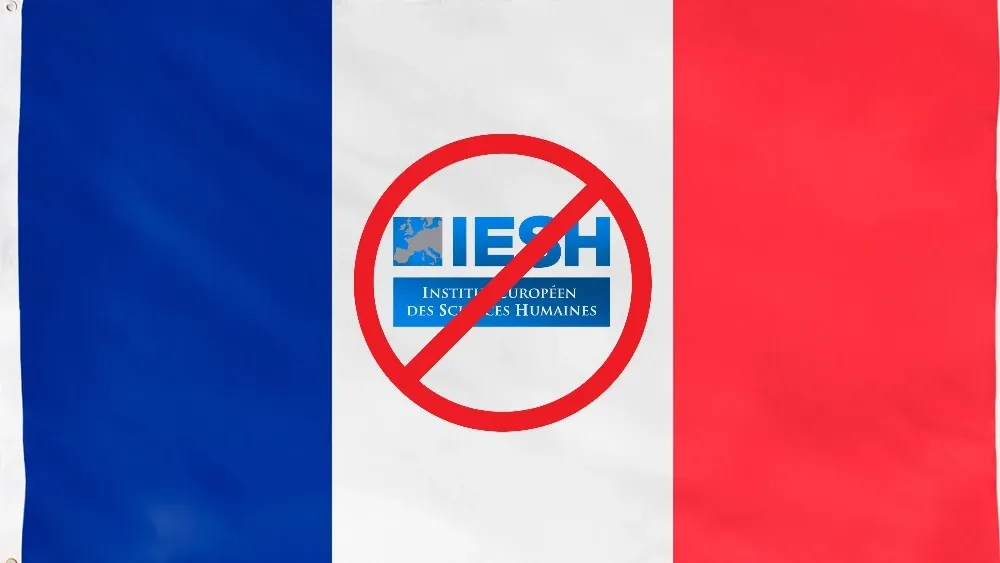 By: Jules Gomes France has dissolved the European Institute of Human Sciences (IESH) for its ties to the Muslim Brotherhood and promotion of radical Islamist ideology. Why it matters: The closure of IESH marks a significant step in France's battle against extremist infiltration, targeting a key institution linked to the Muslim Brotherhood's influence in Europe. Details of the decree: The five-page decree highlighted IESH's curriculum, which advocated for extreme measures like amputation and flogging, and its links to jihadist ideologies. Political reactions: Right-wing leader Marion Maréchal celebrated the closure as a "victory" against Islamism in France, emphasizing its impact on diminishing the Muslim Brotherhood's presence. Looking ahead: While the institution is disbanded, its legacy persists with nearly 1,900 imams trained by IESH still active in France. Before its closure, the seminary had around 200 students—60 percent men, not all of whom became imams. These disturbing facts demonstrate the ongoing challenge of countering radicalization. To read the full article, click here. | | Leftist Party in France Tries To Suppress Exposé On Islamist Ties  By: Jules Gomes La France Insoumise (Indomitable France; LFI), a leading left-wing political party in France's parliament, is attempting to block the release of Omar Youssef Souleimane's book, Les Complices du mal (The Accomplices of Evil), which alleges the party's collaboration with radical Islamists. Why it matters: The book claims LFI, which has the largest number of legislators in the leftist bloc of the National Assembly, is working with Islamists to introduce Sharia-compatible laws in France, a move that could destabilize French democracy and undermine secular values. Key allegations: The book details LFI's ties with Islamist groups, highlighting a strategic alliance aimed at securing the "Muslim community vote." Political implications: Former Salafist imam Bruno Guillot, who left Islam and became Catholic, confirmed that the strategy of the Muslim Brotherhood was to enter French political life via LFI and its leader Jean-Luc Mélenchon. Legal actions: LFI has issued a formal notice to the book's publisher, Plon, demanding a copy of the book and threatening legal action for defamation. To read the full article, click here. | | Mohammed bin Shams al-Din: A Germany-Based YouTube Preacher of Hate 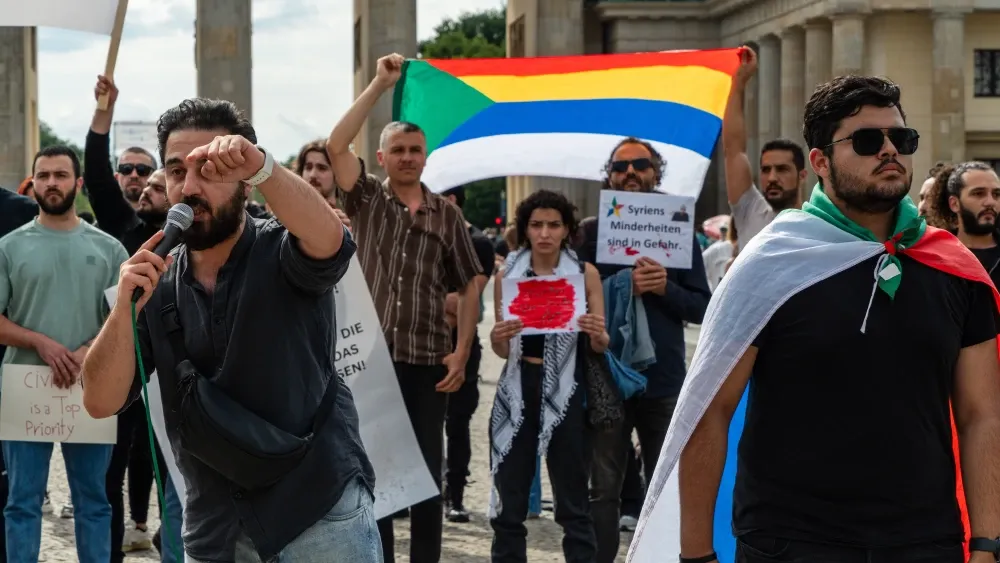 By: Yousef Hisham and Sirwan Kajjo Syrian cleric Mohammad bin Shams al-Din, now based in Germany, has gained notoriety for his polarizing Salafi preaching aimed at young Muslims, particularly migrants in Europe. His radical discourse leans on mass takfir (excommunication) and rejects any gray area. Why it matters: His online platforms, like "The Islamic Encyclopedia" and "Talib al-'Ilm," spread messages that incite hate and division, challenging integration and social cohesion in European societies. Focused targeting: His content targets the Druze community, painting them with a negative image through a series of videos that emphasize alleged secretive and heretical beliefs and casts the community as harboring deep-rooted hostility toward the prophet of Islam Mohammad's companions. Legal and social concerns: While protected by free speech laws, his content raises questions about the limits of expression when it veils hate speech. Community response: The Druze in Germany are mobilizing to protect themselves against growing threats, highlighting the need for stronger measures against radicalism within their midst. To read the full article, click here. | | Italy Trapped in Extradition of Notorious Turkish Mobster as Judges Assess Torture Risks in Turkey 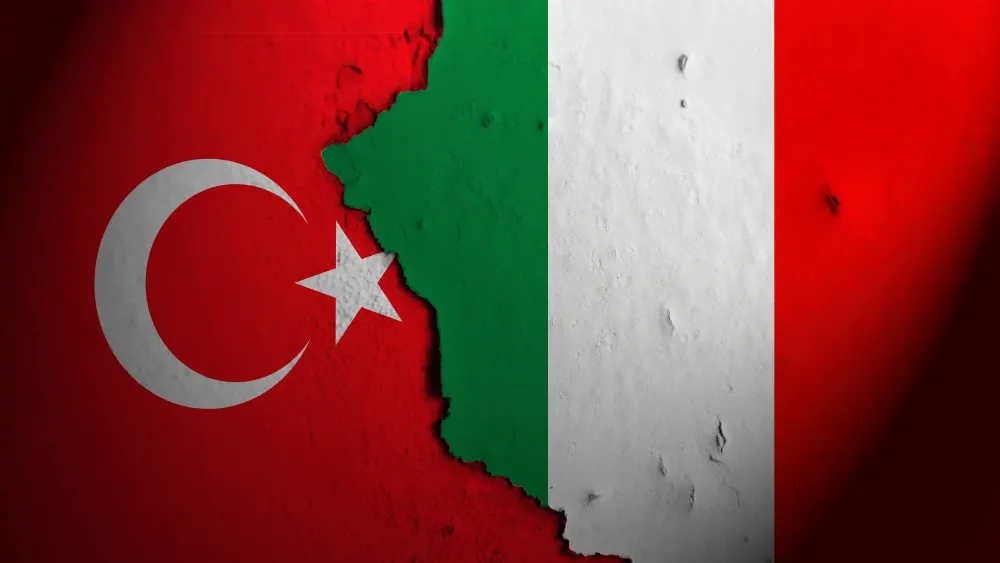 By: Abdullah Bozkurt Italy rejects Turkey's extradition request for mafia boss Barış (Boris) Boyun, citing Turkey's notorious human rights abuses and judicial manipulation under President Recep Tayyip Erdoğan. Why it matters: Turkey exploits its justice system to silence critics and instill fear, raising concerns about the fair treatment of extradited individuals like Boyun. -
Italy's Supreme Court of Cassation demands solid proof of safe detention conditions, highlighting systemic abuses reported by international bodies. -
Judges cannot approve extradition if there is a real risk of torture or degrading treatment in Turkey. Extradition hurdles: Turkey's flawed extradition file, riddled with inconsistencies, fails to provide credible assurances, prompting Italy to meticulously investigate potential human rights violations. Criminal context: Boyun leads a mafia network, implicated in serious crimes in Turkey, while orchestrating operations from Italy, complicating extradition efforts. Wider impact: Italy's handling of the Boyun file is a template for EU practice with Turkey: There are no shortcuts on human rights, even in cases genuinely packaged as high-threat organized crime. A surrender, if it comes, would likely be tethered to hard, monitorable safeguards and a detailed risk record. A refusal would underscore that EU courts will not trade away Article 3 protections of the European Court of Human Rights, even for a notorious suspect. To read the full article, click here. | | | | | Thank you for relying on the Middle East Forum for up-to-date analyses of the region. If you enjoyed this issue of the MEF Dispatch, please forward it to a friend. We invite you to use the comments feature to let us know your thoughts on the Dispatch and the issues we cover. Sincerely, Winfield Myers
Managing Editor, Middle East Forum
Director, Campus Watch | | | | Was this edition useful?  

Your email will be recorded and shared with the sender |        MEF, an activist think tank, deals with the Middle East, Islamism, U.S. foreign policy, and related topics, urging bold measures to protect Americans and their allies. Pursuing its goals via intellectual and operational means, the Forum recurrently has policy ideas adopted by the U.S. government.
Copyright © 2024 Middle East Forum, All rights reserved.
Our mailing address is:
Middle East Forum
1650 Market Street, Suite 3600
Philadelphia, PA 19103 | | | | | Powered by 
| | This email was sent by Middle East Forum via Axios HQ | | | |
0 коммент.:
Отправить комментарий